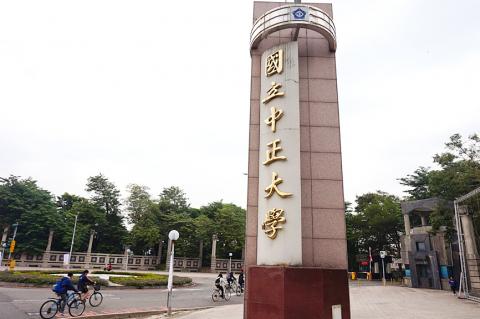Minister of Education Pan Wen-chung (潘文忠) yesterday said that he would meet with the administrators of schools named after former president Chiang Kai-shek (蔣介石) to discuss the Act on Promoting Transitional Justice (促進轉型正義條例), which requires that authoritarian symbols be renamed.
The act is aimed at addressing injustices perpetrated by then-Chinese Nationalist Party (KMT) government between Aug. 15, 1945, when the Japanese government announced it had surrendered, to Nov. 6, 1992, when the Period of National Mobilization for Suppression of the Communist Rebellion (動員戡亂時期) was ended in Kinmen and Lienchiang counties.
Article 5 of the transitional justice act, which was passed on Tuesday by the Legislative Yuan, stipulates that “symbols commemorating authoritarian leaders that are found on public structures or in public spaces must be removed, renamed or dealt with in some other manner.”

Photo: Tsung Nai-chiang, Taipei Times
The legislature’s Education and Culture Committee yesterday deliberated on the Ministry of Education’s budget for next year.
Speaking with reporters after the meeting, Pan said that as public institutions, schools would be required to comply with the new law, adding that he plans to meet with local governments and school administrators to discuss how this can be done.
Part of the process will be finding legally suitable ways of dealing with statues and busts of Chiang found on some school campuses, he said.
Also, schools with names that include the words chung cheng (中正) — a moniker used by Chiang that translates to “fair and honest” — will have to be renamed, he added.
National Chung Cheng University secretary-general Wu Ming-ju (吳明儒) said the school has no predisposition regarding a name change, adding that it would await further instructions from the ministry before making any changes.
As there are many elementary and junior-high schools nationwide that use the name chung cheng, it would be prudent for the ministry to draft a set of measures that schools can take to comply with the new regulations, Wu said.
“The current name has been used [by the university] for 28 years, so any changes should be undertaken cautiously,” Wu said.
When the legislature was in the process of deliberating on the act there were various opinions expressed by schools and students, but those opinions did not likely represent the whole, Wu said.
The university would hold a formal public hearing to gather feedback.

Left-Handed Girl (左撇子女孩), a film by Taiwanese director Tsou Shih-ching (鄒時擎) and cowritten by Oscar-winning director Sean Baker, won the Gan Foundation Award for Distribution at the Cannes Critics’ Week on Wednesday. The award, which includes a 20,000 euro (US$22,656) prize, is intended to support the French release of a first or second feature film by a new director. According to Critics’ Week, the prize would go to the film’s French distributor, Le Pacte. "A melodrama full of twists and turns, Left-Handed Girl retraces the daily life of a single mother and her two daughters in Taipei, combining the irresistible charm of

A Philippine official has denied allegations of mistreatment of crew members during Philippine authorities’ boarding of a Taiwanese fishing vessel on Monday. Philippine Bureau of Fisheries and Aquatic Resources (BFAR) spokesman Nazario Briguera on Friday said that BFAR law enforcement officers “observed the proper boarding protocols” when they boarded the Taiwanese vessel Sheng Yu Feng (昇漁豐號) and towed it to Basco Port in the Philippines. Briguera’s comments came a day after the Taiwanese captain of the Sheng Yu Feng, Chen Tsung-tun (陳宗頓), held a news conference in Pingtung County and accused the Philippine authorities of mistreatment during the boarding of

88.2 PERCENT INCREASE: The variants driving the current outbreak are not causing more severe symptoms, but are ‘more contagious’ than previous variants, an expert said Number of COVID-19 cases in the nation is surging, with the Centers for Disease Control (CDC) describing the ongoing wave of infections as “rapid and intense,” and projecting that the outbreak would continue through the end of July. A total of 19,097 outpatient and emergency visits related to COVID-19 were reported from May 11 to Saturday last week, an 88.2 percent increase from the previous week’s 10,149 visits, CDC data showed. The nearly 90 percent surge in case numbers also marks the sixth consecutive weekly increase, although the total remains below the 23,778 recorded during the same period last year,

The Chinese Communist Party (CCP) is pushing for residents of Kinmen and Lienchiang counties to acquire Chinese ID cards in a bid to “blur national identities,” a source said. The efforts are part of China’s promotion of a “Kinmen-Xiamen twin-city living sphere, including a cross-strait integration pilot zone in China’s Fujian Province,” the source said. “The CCP is already treating residents of these outlying islands as Chinese citizens. It has also intensified its ‘united front’ efforts and infiltration of those islands,” the source said. “There is increasing evidence of espionage in Kinmen, particularly of Taiwanese military personnel being recruited by the